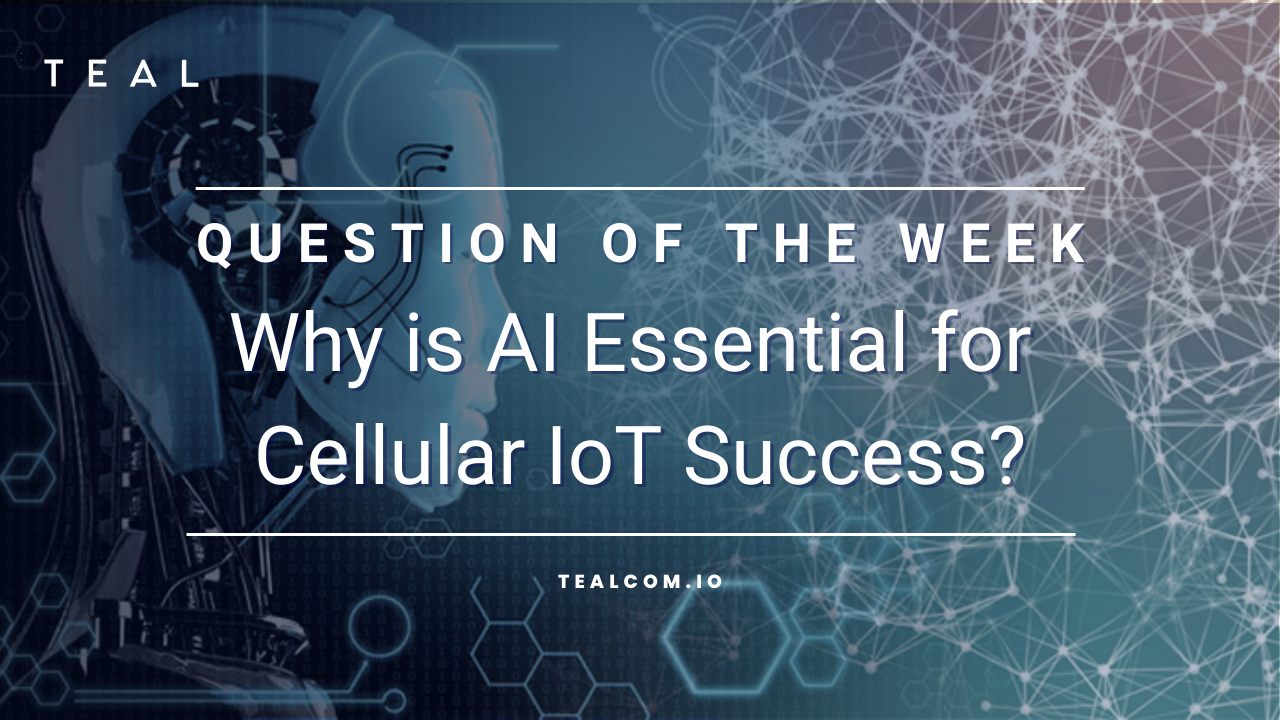Why is AI Essential for Cellular IoT Success?

Harnessing the Power of AI for Cellular IoT Use Cases
The potential of cellular Internet of Things (IoT) use cases is enormous. From smart cities to connected cars, cellular IoT has enabled a world that is more connected and automated than ever before. But to truly unlock its potential, one critical component must be present: AI. Why is AI so important for unlocking the power of cellular IoT use cases? In this blog post, we’ll explore how businesses can use AI and cellular IoT to increase efficiency and maximize profits.
Artificial Intelligence (AI) and the Internet of Things (IoT) are becoming increasingly popular tools for businesses. As technology advances, more companies are leveraging these powerful tools to gain a competitive edge in the marketplace. But before we can understand how AI is enabling the future of IoT, it’s important to understand AI.
AI is an area of computer science that focuses on creating intelligent machines that can work autonomously without direct human input. AI is used to optimize processes, automate tasks, and make decisions without relying on manual labor or human intervention. It is often used in robotics, natural language processing (NLP), image recognition, and machine learning.
Businesses are leveraging the power of artificial intelligence (AI) and the Internet of Things (IoT) to increase efficiencies, improve customer experience, and stay ahead of their competitors. AI is a key component of cellular IoT automation because it enables businesses to analyze large amounts of data quickly and accurately. With AI, businesses can use this data to make better decisions faster than ever before. For example, with AI-powered automation, it’s now possible for smart city networks to sense traffic patterns and adjust signal timing accordingly to reduce congestion and improve safety. Similarly, AI can be used to automate the identification and repair of issues in connected cars before they become major problems. By monitoring their supply chains more closely, organizations can better manage inventory levels and reduce waste from overproduction or underproduction. Businesses are also finding other uses for AI such as for customer service automation so customers can quickly get answers to their questions without having to wait for a live representative or contact customer service via phone or email. Let’s examine 4 ways that AI is enabling IoT use cases for businesses across many industries.
4 Ways That AI is Having a Big Impact on IoT
AI and IoT can be used to automate processes, gather data, create predictive models, and optimize operations. Let’s take a look at how businesses are using these technologies.
- Automating Processes with AI & IoT
Perhaps the most important reason why AI is critical for cellular IoT use cases is because it unlocks automation opportunities that were previously impossible. Businesses are using AI and IoT to automate processes that would otherwise be performed manually. For example, connected sensors can collect data about temperature, humidity, vibration, or other physical parameters in a factory setting. This data is then processed by an AI algorithm to measure performance and detect anomalies. With this information, businesses can quickly identify problems in production lines or machines that require maintenance. Automated systems not only save time but also reduce mistakes due to human error.
- Gathering Data with AI & IoT
AI and IoT can also help businesses gather valuable data from customers that they can use to make informed decisions about their products and services. Companies can use sensors in retail stores or smart devices in homes and offices to collect data about customer behavior without having to ask directly for it. This type of data gathering helps them understand trends in customer preferences as well as what works best for their target market.
- Creating Predictive Models with AI & IoT
Businesses are leveraging AI and IoT together to create predictive models that can forecast future outcomes based on past events or scenarios. For example, companies can use predictive analytics to anticipate customer needs before they even happen by analyzing previous sales patterns or consumer trends over time. By being able to anticipate customer demand ahead of time, businesses can better prepare for it by having the right amount of resources available when needed. Companies are also using AI for predictive maintenance on equipment or machinery so they can identify potential problems before they occur and avoid costly downtime or repairs.
- Improved Security
AI is important for unlocking the potential of cellular IoT use cases because it helps improve security measures within these networks. By leveraging machine learning algorithms, AI can detect suspicious activity on a network more quickly and accurately than ever before—allowing organizations to act before a breach occurs or an attack succeeds. This enhanced level of security helps ensure that data remains secure and protected from malicious actors who may try to exploit vulnerabilities within the network.
Leveraging AI and Cellular IoT for Business Success
AI has revolutionized the way we think about cellular IoT use cases by enabling automation, optimization, and improving security measures within these networks. From smart cities to connected cars, cellular IoT has opened a world of possibilities—and with the help of AI technology, those possibilities are only increasing as time goes on. Businesses can leverage AI for cellular IoT automation by using various tools and techniques such as machine learning algorithms and natural language processing (NLP). These tools allow businesses to analyze large amounts of data quickly and accurately in order to make decisions or detect anomalies in the system. Additionally, NLP can help businesses develop automated systems that respond intelligently when receiving input from users or other devices connected via cellular networks. By leveraging these tools and techniques, businesses can take advantage of all the benefits offered by cellular IoT automation while keeping costs down. If your organization wants to take full advantage of all that today’s advanced technologies have to offer, then it’s time to start exploring how you can incorporate AI into your cellular IoT deployments.
IoT automation coupled with access to high performance cellular networks is a winning combination for businesses everywhere. Cellular connectivity offers many benefits such as lower costs, higher speeds, and better reliability. Additionally, cellular networks can be used to send remote commands to devices as well as receive data from them. Discover why leading organizations are turning to eSIM technology for reliable global connectivity. With Teal, businesses can connect any device onto any network worldwide. Teal is the only GSMA certified, wholly owned eSIM platform that gives businesses the control to switch between networks on demand.
Find out if eSIM technology is a fit for your business. Contact a Teal IoT expert today!
Learn more about the benefits of leveraging AI and IoT across industries.
Recent Posts
TEAL’s Network Orchestration Service (NOS) is Changing Cellular Connectivity
Teal Communications Staff2025-07-15T19:59:45+00:00
How TEAL’s eSIM Technology is Shaping the Future of Drone AAM Policy Under FAA Part 108
Teal Communications Staff2025-07-08T16:48:15+00:00
Empowering Freedom, Independence, and Control Through TEAL’s Network Orchestration Service (NOS)
Teal Communications Staff2025-07-03T16:40:46+00:00




